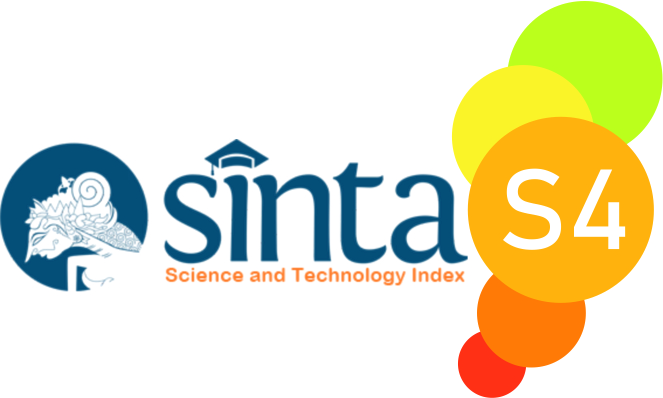Cooperative of Team Games Tournament to Enhance Learning Outcomes in English Learning
Abstract
The challenge of teaching English to students with low academic achievement is what inspired this line of inquiry. The purpose of this research was to provide an explanation of how the Team Games Tournament was implemented Elementary class in order to improve the English learning outcomes of the pupils. The type of action research that was conducted in the classroom for the purpose of this study was approached from a qualitative point of view. A total of 24 students took part in this research project, both as instructors and as research subjects. As means of collecting data for the purpose of this investigation, observation reports, learning progress examinations, and documentation were utilized. The findings of the research are that the implementation of the Team Games Tournament was generally carried out in an effective manner. Less teacher activity was recorded during Cycle I Meeting I, which sufficient category, however, more teacher activity was recorded during Meeting II, which rated as "good." Because of this, the student's results in learning English have iincreased. The implementation of the Team Games Tournament learning model in an educational of elementary school to improve the learning outcomes for students has been shown to be beneficial.
References
Dawadi, S., Shrestha, S., & Giri, R. A. (2021). Mixed-Methods Research: A Discussion on its Types, Challenges, and Criticisms. Journal of Practical Studies in Education, 2(2), 25–36. https://doi.org/10.46809/jpse.v2i2.20
Elizabeth, K. (2020). Implementing NHT and TGT to Enhance Students’ Knowledge of Passive and Active Voice Construction: Comparative Study. Acuity Journal, 4(2), 69–93.
Erickson, L. v, & Sammons-Lohse, D. (2020). Learning through video games: The impacts of competition and cooperation. E-Learning and Digital Media, 18(1), 1–17. https://doi.org/10.1177/2042753020949983
Firdaus, F., Subchan, W., & Narulita, E. (2020). Developing STEM-based TGT learning model to improve students’ process skills. JPBI (Jurnal Pendidikan Biologi Indonesia), 6(3). https://doi.org/10.22219/jpbi.v6i3.12249
Hu, Y. H., Asistido, R. L., & Villanueva, M. J. O. (2021). Influencing variables and implications in the teacher-student relationships. European Journal of Educational Research, 10(3), 1317–1327. https://doi.org/10.12973/EU-JER.10.3.1317
Kaybiyaynen, D.-A., & Kaybiyaynen, A. (2015). University as a center of project-based learning of school students. 2015 International Conference on Interactive Collaborative Learning (ICL). https://doi.org/10.1109/icl.2015.7318168
Ma, J., & Coogler, K. (2020). Learning-by-Doing: Development of Project-Based Manufacturing Courses. 2019 ASEE Annual Conference & Exposition Proceedings. https://doi.org/10.18260/1-2–33055
McDonald, S. (2005). Studying actions in context: a qualitative shadowing method for organizational research. Qualitative Research, 5(4), 455–473. https://doi.org/10.1177/1468794105056923
Nazaruddin, I., & Rahmawati, P. (2020). Development of Innovative Student Worksheets Based on Project-Based Learning: Improve the Learning Outcomes. Jurnal Inovasi Pendidikan Dasar, 6(1), 31–38. https://doi.org/10.22236/jipd.v6i1.152
Park, E. J. (2021). Affordances and challenges of mixed-methods needs analysis for the development of ESP courses. Language Teaching Research Quarterly, 23, 12–22. https://doi.org/10.32038/ltrq.2021.23.03
Prencipe, A., & Tell, F. (2001). Inter-project learning: processes and outcomes of knowledge codification in project-based firms. Research Policy, 30(9), 1373–1394. https://doi.org/10.1016/s0048-7333(01)00157-3
Steinkuehler, C. (2009). Games, Learning and Society. E-Learning and Digital Media, 6(1), 1–3. https://doi.org/10.2304/elea.2009.6.1.1
Susanto, H., Tinggi, S., & Bontang, T. (2021). An Analysys About Students’ Troubles in Acquisition English Vocabulary. Journey: Journal of English Language and Pedagogy , 4(2), 46–50. http://ejurnal.budiutomomalang.ac.id/index.php/journey
Tseng, T.-L., Akundi, A., Wu, T., Lin, Y., & Jack, H. (2016). Evaluating Individual Learning Effectiveness on Project-Based Learning Methodology by Comparing Team-Based and Individually Assigned Projects. 2016 ASEE Annual Conference & Exposition Proceedings. https://doi.org/10.18260/p.26753
Veloo, A., Md-Ali, R., & Chairany, S. (2016). Using Cooperative Teams-Game-Tournament in 11 Religious School to Improve Mathematics Understanding and Communication. In Malaysian Journal of Learning and Instruction (Vol. 13, Issue 2). http://mjli.uum.edu.my
Williamson, B. (2007). Viewpoints: Teaching and learning with games? Learning, Media and Technology, 32(1), 99–105. https://doi.org/10.1080/17439880601141492
Copyright (c) 2023 Faidah Yusuf, Hikmawati Usman, Muhammad Irfan, Latri Aras, Hardianto Rahman

This work is licensed under a Creative Commons Attribution-ShareAlike 4.0 International License.

Journey: Journal of English Language and Pedagogy by http://ejurnal.budiutomomalang.ac.id/index.php/journey/index is licensed under a Creative Commons Attribution-ShareAlike 4.0 International License.






